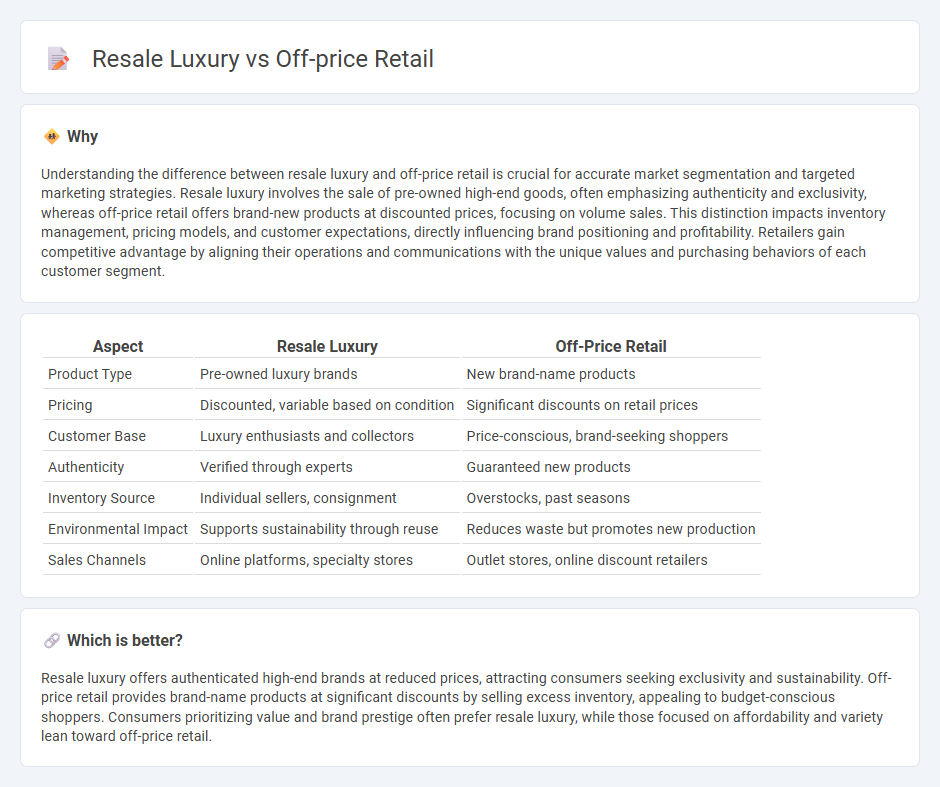
Resale luxury and off-price retail offer distinct approaches to premium shopping experiences, with resale luxury focusing on authenticated pre-owned high-end products, while off-price retail provides brand-new designer goods at discounted prices. Both sectors cater to value-conscious consumers seeking quality and exclusivity without paying full retail costs. Explore the evolving dynamics and benefits of resale luxury versus off-price retail to understand their growing influence in the retail market.
Why it is important
Understanding the difference between resale luxury and off-price retail is crucial for accurate market segmentation and targeted marketing strategies. Resale luxury involves the sale of pre-owned high-end goods, often emphasizing authenticity and exclusivity, whereas off-price retail offers brand-new products at discounted prices, focusing on volume sales. This distinction impacts inventory management, pricing models, and customer expectations, directly influencing brand positioning and profitability. Retailers gain competitive advantage by aligning their operations and communications with the unique values and purchasing behaviors of each customer segment.
Comparison Table
| Aspect | Resale Luxury | Off-Price Retail |
|---|---|---|
| Product Type | Pre-owned luxury brands | New brand-name products |
| Pricing | Discounted, variable based on condition | Significant discounts on retail prices |
| Customer Base | Luxury enthusiasts and collectors | Price-conscious, brand-seeking shoppers |
| Authenticity | Verified through experts | Guaranteed new products |
| Inventory Source | Individual sellers, consignment | Overstocks, past seasons |
| Environmental Impact | Supports sustainability through reuse | Reduces waste but promotes new production |
| Sales Channels | Online platforms, specialty stores | Outlet stores, online discount retailers |
Which is better?
Resale luxury offers authenticated high-end brands at reduced prices, attracting consumers seeking exclusivity and sustainability. Off-price retail provides brand-name products at significant discounts by selling excess inventory, appealing to budget-conscious shoppers. Consumers prioritizing value and brand prestige often prefer resale luxury, while those focused on affordability and variety lean toward off-price retail.
Connection
Resale luxury and off-price retail share a symbiotic relationship by addressing consumer demand for premium brands at reduced prices, seamlessly blending exclusivity with affordability in the retail market. The resale luxury sector capitalizes on authenticated pre-owned luxury goods, while off-price retailers leverage overstock and past-season items from luxury brands, both expanding accessibility to high-end products. Together, they influence market dynamics by promoting sustainable consumption and offering diversified channels for luxury brand engagement.
Key Terms
Inventory Sourcing
Off-price retail sources inventory primarily through overstock, cancellations, and manufacturer excess, maintaining brand-new items at reduced prices. Resale luxury, however, relies on pre-owned, authenticated goods acquired from individual sellers, consignments, and estate sales, emphasizing uniqueness and provenance. Explore the differences in inventory sourcing to understand their impact on pricing and customer experience.
Pricing Strategy
Off-price retail leverages bulk purchasing and limited product seasons to offer luxury goods at 20-60% below traditional retail prices, targeting price-sensitive consumers seeking brand authenticity. Resale luxury pricing depends on item condition, rarity, and brand demand, often motivating sellers to price higher for exclusive or vintage pieces in secondary markets like The RealReal or Vestiaire Collective. Explore in-depth analyses to understand how these pricing strategies shape consumer behavior and market dynamics in the luxury sector.
Brand Authenticity
Off-price retail offers luxury brands at discounted prices while maintaining brand authenticity through direct manufacturer partnerships and controlled inventory channels. Resale luxury markets rely on rigorous authentication processes and expert verification to ensure pre-owned items remain genuine and uphold brand value. Explore how both models balance affordability and trust to better understand luxury brand authenticity.
Source and External Links
Off-price - Wikipedia - Off-price retail is a discount trading format where retailers buy large volumes of overproduced or excess branded goods directly from manufacturers and sell them at 60-65% off average prices found in brand stores, offering customers high-quality brand products at significantly lower prices than traditional retailers.
Off-Price - Salsify - The off-price retail model involves selling branded items at deep discounts (typically 40-60%) to clear excess stock, benefiting both brands by reducing warehousing costs and customers by providing designer goods at reduced prices.
Should Off-Price Retailers Be in Your Wholesale Plan? - Shopify - Off-price retail businesses sell brand-name or designer products at prices 20%-90% lower by buying unsold, overstocked, or slightly imperfect items from manufacturers and stores, with types including independent off-price, closeout, sample, retailer-owned off-price, and factory outlets.
 dowidth.com
dowidth.com